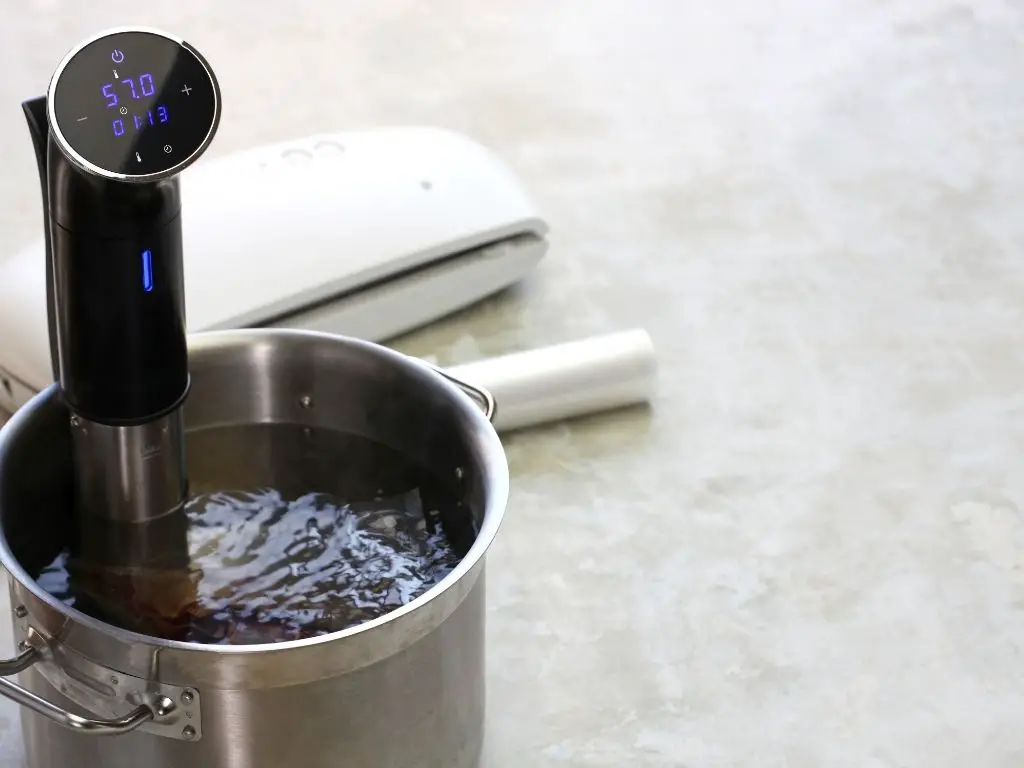What is Sous Vide Cooking?
Sous vide is a method of cooking food sealed in airtight plastic bags submerged in a water bath at precisely controlled temperatures. The French term “sous vide” literally means “under vacuum” referring to the vacuum sealing of the food in plastic.
Sous vide cooking allows food to be cooked slowly and gently at lower temperatures than traditional cooking methods. This precision temperature control enables food to be cooked evenly edge to edge without over or undercooking. It also retains moisture, intensifies flavors, and preserves the natural juices and textures of food.

Sous Vide Products I Use Every Day
As an Amazon affiliate, I earn from qualifying purchases.
Last update on 2025-02-01 / Affiliate links / Images from Amazon Product Advertising API
What is Sous Vide Cooking?
Sous vide is a method of cooking food sealed in airtight plastic bags submerged in a water bath at precisely controlled temperatures. The French term “sous vide” literally means “under vacuum” referring to the acuum sealing of the food in plastic.
Sous vide cooking allows food to be cooked slowly and gently at lower temperatures than traditional cooking methods. This precision temperature control enables food to be cooked evenly edge to edge without over or undercooking. It also retains moisture, intensifies flavors, and preserves the natural juices and textures of food.
What is the Lowest Temperature for Sous Vide Cooking?
The lowest temperature that is safe and effective for sous vide cooking is 130°F (54°C). However, most proteins and vegetables are typically cooked at higher temperatures between 135-185°F (57-85°C) depending on the desired result.
Cooking at very low temperatures below 130°F is not recommended because it may allow bacterial growth if held for extended periods of time. While pasteurization does occur eventually even at low temperatures given enough time, the risk is too high for prolonged incubation in the “danger zone” between 40-130°F.
Why Use Low Temperatures in Sous Vide Cooking?
There are several benefits to using lower temperatures in sous vide cooking:
For Tenderizing Meat
Cooking tough cuts of meat like chuck roast, brisket, or pork shoulder at temperatures around 135-145°F (57-63°C) for long periods of time helps break down collagen and connective tissues. The result is very tender and succulent meat.
For Preserving Nutrients
Lower temperatures are gentler and help preserve the natural vitamins and nutrients in food that may be degraded at higher temperatures. Vegetables cooked sous vide at 185°F or below retain more nutrients than boiling, steaming, or roasting.
For Enhancing Flavors
Cooking at lower temperatures concentrates flavors as moisture evaporates slowly over time while preventing vegetables and meat from taking on a roasted or caramelized flavor from high heat. Herbs and spices infuse more deeply into food as well.
For Food Safety
While higher temperatures kill bacteria faster, cooking below 130°F can still pasteurize food safely given extended time. If time and temperature guidelines are followed correctly, low temperature sous vide provides a huge safety benefit by eliminating the risk of overcooking.
What Foods Are Best Cooked at Low Temperatures?
Many foods especially benefit from sous vide cooking at lower temperatures:
Fish and Seafood
Delicate fish like salmon, cod, snapper, and shellfish should be cooked at 120-130°F to prevent overcooking into tough, rubbery textures. Cooking seafood sous vide ensures perfect doneness edge to edge.
Poultry
Chicken and turkey breasts cooked between 145-165°F are incredibly tender and juicy. Dark meat poultry legs and wings are best cooked up to 175-185°F.
Vegetables
Most vegetables are cooked between 185-195°F to become tender while retaining a crisp texture. Harder vegetables may be cooked as low as 170°F for very al dente texture.
Eggs
Slow cook eggs at 147°F for soft boiled, 167°F for jammy soft poached, and 185°F for fully set hard boiled consistency.
Desserts
Creme brûlée, pudding, cheesecake and other custards are gently cooked at around 175°F to prevent curdling and overcooking. Fruits and chocolate cook from 140-185°F.
How to Safely Use Low Temperatures in Sous Vide
It’s important to follow proper food safety guidelines when cooking at lower temperatures:
- Pre-sear meat and poultry before bagging to kill surface bacteria
- Use previously frozen or fresh meats rather than thawed
- Cook for the appropriate time and temperature to achieve pasteurization
- Chill food quickly after cooking and avoid keeping in the “danger zone” above 40°F
- Only reheat cooked food to serving temperature, do not reuse for sous vide
Popular Low Temperature Sous Vide Recipes
Here are some delicious recipes taking advantage of lower temperature sous vide cooking:
- 36-48 hour Short Ribs cooked at 135°F for fall-off-the-bone tenderness
- 72 hour Sous Vide Chuck Roast at 135°F becomes incredibly tender
- Juicy Chicken Breasts are foolproof cooked for 1-2 hrs at 145°F
- Succulent Pork Chops cook for 2-3 hours at 135°F
- Salmon is flaky and moist when cooked 1 hr at 120°F
- Eggs develop creamy soft boiled or poached textures when cooked for 45 min at 147°F and 167°F respectively
- Cheesecake and creme brûlée achieve smooth, creamy results after 2-3 hours at 176°F
Sous vide cooking at lower temperatures delivers superior texture, moisture, and flavor compared to other cooking methods. With proper handling, quality ingredients, and precise time/temperature control, sous vide enables cooking food safely with incredible results at both high and low temperatures.


![IMPRESA [10 Pack] Sous Vide Magnet Weights for Keeping Bags Submerged – Sous Vide Accessories to Stop Floating Bags & Undercooking – Weighted Magnets for Containers](https://m.media-amazon.com/images/I/41zHpl8G2lL._SL160_.jpg)

